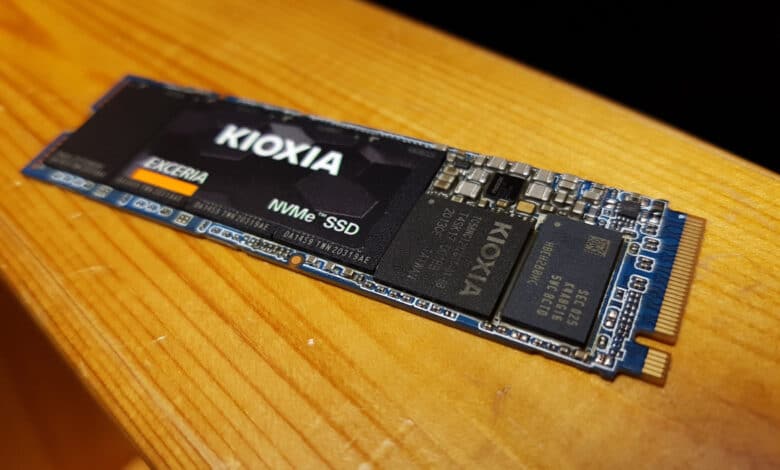
With the Exceria NVMe SSD series, the Tokyo-based storage manufacturer Kioxia, which was spun off from Toshiba in 2018, sells a fast and compact storage solution that is also aimed at upgraders who want to expand their PC or notebook storage in a simple way and increase its performance at the same time.
The NVMe 1.3c instruction set used by the Exceria promises particularly low latencies between the SSD and CPU. The Exceria SSD is offered with the SATA interface as well as PCIe, whereby the expected speeds are already very limited by the interface itself, which makes it primarily aimed at upgraders whose motherboard does not have an M.2 slot.
The Exceria SSD with PCIe interface is manufactured in the compact M.2-2280 form factor and should therefore fit on most motherboards with a corresponding slot. Besides the normal version, it is also offered in an extended version, which offers even higher capacities and speeds. We also took a look at the Exceria PLUS 2TB in another article.
In this article, we highlight the Exceria SSD in the M.2 design with 1 TB capacity for you, which is aimed at the broad mass of users and is priced at around €88 (currently € 69.95 *) with comparable models from the competition.
Specifications
| Physical | |
| Capacity | 250 GB, 500 GB, 1,000 GB |
| Form Factor | M.2 Type 2280-S2-M |
| Interface | PCI Express® Base Specification Revision 3.1a (PCIe®) |
| Flash memory type | BiCS FLASH™ TLC |
| Maximum interface speed | 32 GT/s (PCIe® Gen3x4L) |
|
Dimensions (Max.: LxWxH)
|
80.15 x 22.15 x 2.23 mm |
| Interface commands | “NVM Express™ Revision 1.3c” command set |
| weight | 250 GB: 6.0 g (typ.). 500 GB, 1,000 GB: 6.9 g (typ.) |
| Performance | |
| Max. sequential read speed(1) | 1,700 MB/s |
| Max. sequential write speed(1) | 250 GB: 1,200 MB/s. 500 GB, 1,000 GB: 1,600 MB/s |
| Max random read speed(2) | 250 GB: 200,000 IOPS. 500 GB, 1,000 GB: 350,000 IOPS |
| Max random write speed(2) | 250 GB: 290,000 IOPS. 500 GB, 1,000 GB: 400,000 IOPS |
| Longevity: TBW (Total Bytes Written)(3) | 250 GB: 100 TB 500 GB: 200 TB 1,000 GB: 400 TB |
| MTTF | 1.5 million hours |
| Environment | |
| Operating temperature | 0 °C (Ta) to 85 °C (Tc) |
| Storage temperature | -40-85 °C |
| Shock resistance | 9.806 km/s2 {1,000 G} 0.5 ms half-sine wave |
| Vibration | 196 m/s2 {20 G} peak, 10~2,000 Hz, (20 min/axis) x 3 axes |
| Mains voltage | 3.3 V ±5 % |
| Power consumption | PS3: 50 mW (typ.) PS4: 5 mW (typ.) |
| Power consumption (active) | 250 GB: 3.8 W (typ.) 500 GB: 3.9 W (typ.) 1,000 GB: 5.3 W (typ.) |
| Compatibility | |
| PCI Express | Compatible with the “PCI Express® Base Specification Revision 3.1a” and “NVM Express™ Revision 1.3c” instruction set |
| Connection type | M.2-M key socket |
| Target applications | Client desktops and laptops |
| Other features | |
|
Services and support
|
5-year manufacturer warranty |
|
Performance optimization
|
TRIM, garbage collection at rest |
|
Price
|
€ 69.95 * |
(1) “EXCERIA PLUS” SSD/EXCERIA SSD: Sequential speeds measured with CrystalDiskMark 6.0.2 x64, Q=32, T=1.
EXCERIA SATA SSD: Sequential speeds are measured with ATTO v3.05, QD10.
Figures represent the best values obtained in a specific test environment by KIOXIA Corporation. KIOXIA Corporation does not guarantee read or write speeds in specific devices. Read and write speeds may vary depending on the device used and the pertinent file size.
(2) “EXCERIA PLUS” SSD/EXCERIA-SSD: Random performance at 4 KiB is measured using CrystalDiskMark 6.0.2 x64, Q=32,T=8.
EXCERIA-SATA: Random performance at 4 KiB is measured with CrystalDiskMark 5.1.2 x64 QD32.
Data represents the best values obtained in a specific test environment by KIOXIA Corporation. KIOXIA Corporation does not guarantee read or write speeds in specific devices. Read and write speeds may vary depending on the device used and the pertinent file size.
(3) “EXCERIA PLUS” SSD/EXCERIA SSD: Definition and terms of TBW (Terabytes Written) are based on JEDEC standard (JESD219A Solid-State Drive Endurance Workloads, July 2012) and apply to the life of the product.
EXCERIA-SATA-SSD: Definition and terms of TBW (Terabytes Written) are based on the JEDEC standard (JESD218A, February 2011) and apply for the life of the product.

Packaging and scope of delivery
Kioxia’s Exceria SSD is lightweight and shockproof wrapped in a plastic shell surrounded by cardboard. The packaging is otherwise only accompanied by an instruction manual (Quick Start Guide). A screw needed for mounting in the M.2 slot is not included, this can usually be taken from the motherboard accessories.
The versatile and clear program “KIOXIA SSD Utility” is also available on the manufacturer’s website, which can be used to maintain and test the SSD memories from Kioxia’s range.
Test system
The system we used for this test had the following components:
- MSI X470 Gaming Plus Max
- be quiet! Pure Power 11 FM 750W
- Gigabyte GTX 1660 Ti
- SI MAG Coreliquid 360r
- AMD Ryzen 7 3700X
- 2x 16GB DDR4 3600MHz RAM
Regarding our test system, it should be said that the MSI X470 Gaming Plus Max motherboard has two M.2 slots. Apart from the fact that when using the second slot, depending on the type of M.2 SSD used – PCIe or SATA – the respective resource on the motherboard is taken elsewhere, the performance of the second slot (PCIe Gen 2) is also limited compared to the first one (PCIe Gen 3) and would have thus distorted the speeds in our test. That this is the case was also pointed out to us by Kioxia’s SSD Utility, whereupon we switched to the first slot.
Users who want to fully utilize multiple SSDs should therefore consider whether the performance of the available M.2 slots is sufficient for this and whether buying one or more M.2 SSDs with very high transfer rates makes sense at all in view of the motherboard’s performance capacities. More details about this can usually be found in the specifications of the motherboard manufacturer. If in doubt, always use the fastest M.2 SSD in the first slot of the motherboard.
Performance
We consulted the AS SSD, HD Tune Pro, ATTO Disk and Crystal Disk Mark programs to evaluate the Exceria’s performance. Compared to the M.2 SSDs we’ve tested so far, it was mostly in the lower mid-range in terms of performance, with occasional spikes up or down.
We also compared it with Samsung’s NVMe SSD model “980” with 1 TB capacity, which we have also already tested in the past and is currently about 20 € more expensive than Kioxia’s entry-level model.
In HD Tune Pro, the Exceria places in the top third of our M.2 rankings, overtaking the Samsung 980 1 TB by a few spots as well.
While the Exceria still ranks in the lowest places in the sequential transfers in the AS SSD benchmark and is also clearly outclassed by the Samsung 980, it puts itself ahead of at least half of the other test drives in terms of random reads and writes (4K and 4K-64Thrd) and even makes it into the upper third in 4K reads and writes. Accordingly, the Samsung 980 is consistently beaten by the Exceria in this category, which therefore ends up in the good midfield of the AS SSD overall score, two places ahead of the Samsung 980.
The more practical copy benchmark, on the other hand, shows a somewhat weaker result. Here, the Exceria only makes it into the lower third of the results, but can at least leave the Samsung 980 behind in the ISO and program categories, even if partly only just.
The Crystal Disk Mark once again reveals the Exceria’s biggest weakness: its comparatively low sequential transfer rates. As a result, the Exceria is once again among the lowest performers in this category, with the Samsung 980 clearly outperforming it. As in AS SSD, the Exceria is able to outperform almost half of the test drives in the random transfer category, and can usually overtake the Samsung 980 by a few places.
In Atto Disk Benchmark, the Exceria manages to get into the upper midfield of the ranking of all drives tested so far in random reading of smaller files with a size of 512 bytes to 1 MB. However, the performance drops significantly above a file size of 1 MB, so that it slips to the lowest places. Accordingly, it can only beat the Samsung 980 here as well for small file sizes.
The random write performance is a bit more balanced. Here, the Exceria can still hold its ground in the midfield for small file sizes and also overtake the Samsung 980 and finally makes it into the upper third of the ranking with the transfer of larger files, where it is then, however, again consistently beaten by the Samsung.
The achieved access times in HD Tune Pro and AS SSD were between 0.022 and 0.025 ms, which puts the Exceria in the good midfield and roughly on par with the Samsung 980.
In summary, we can say that the Exceria’s strength in our database comparison is more in random (random) accesses, which are more common in everyday use, and it is clearly outperformed by many of the drives in our database in the area of sequential reads and writes, although most of them are also priced higher. The same applies to the comparison with the Samsung 980.
Looking at the manufacturer’s specifications, the Exceria achieves the stated sequential speeds of 1700 and 1600 MB/s in the current Crystal Disk Mark 7.0.0 with about 1750 and 1605 MB/s (the manufacturer used Crystal Disk Mark 6.0.2 for its specifications). We generated the values for our databases with Crystal Disk Mark 5.2.1, which ascertained lower values of 1452 MB/s for the sequential write, which, however, did not have a significant impact on the placement in the SSD comparison.
The manufacturer’s values of 350,000 and 400,000 IOPS for random read and write are also achieved with about 368,200 and 398,500 IOPS.
| wdt_ID | SSD | Seq (lesen in MB/s) | Seq (schreiben in MB/s) | 4K (lesen in MB/s) | 4K (schreiben in MB/s) | 4K-64-Thrd (lesen in MB/s) | 4K-64-Thrd (schreiben in MB/s) |
|---|---|---|---|---|---|---|---|
| 1 | Samsung SSD 960 PRO 2 TB | 2.278,89 | 1.832,34 | 47,47 | 197,25 | 1.690,47 | 1.211,18 |
| 2 | Samsung SSD 960 EVO 1 TB | 2.833,98 | 1.977,16 | 38,95 | 207,29 | 1.301,00 | 992,33 |
| 3 | Plextor M8SeGN 256 GB | 2.170,45 | 637,79 | 35,37 | 5,44 | 282,25 | 8,73 |
| 4 | Plextor M9PeG 512 GB | 2.246,29 | 880,66 | 41,74 | 7,49 | 511,00 | 31,01 |
| 5 | Samsung SSD 970 EVO 2TB | 2.553,25 | 2.481,28 | 42,45 | 110,08 | 1.687,72 | 1.901,41 |
| 6 | Crucial P1 500 GB | 1.774,87 | 927,44 | 59,92 | 172,76 | 346,82 | 878,87 |
| 7 | Samsung SSD 970 Evo Plus 250 GB | 2.794,51 | 2.204,05 | 54,37 | 132,99 | 795,31 | 1.930,24 |
| 8 | WD Black SN750 1TB | 2.966,45 | 2.690,48 | 45,74 | 149,72 | 1.580,57 | 1.740,14 |
| 9 | WD Blue SN550 500 GB | 2.178,75 | 858,33 | 36,35 | 155,07 | 747,57 | 385,85 |
| 10 | Corsair MP510 480 GB | 2.409,10 | 1.264,05 | 48,06 | 148,67 | 684,76 | 1.258,88 |
| 11 | LC-Power Phenom Pro 1 TB | 2.926,34 | 2.560,03 | 56,02 | 144,17 | 1.199,26 | 1.390,36 |
| 12 | Pioneer APS-SE20Q 1 TB | 2.728,68 | 1.740,70 | 47,48 | 137,52 | 721,73 | 1.441,33 |
| 13 | XPG Spectrix S40G 1 TB | 2.833,85 | 1.496,62 | 46,72 | 110,77 | 1.240,11 | 836,95 |
| 14 | Team Group Cardea IOPS 1 TB | 2.860,91 | 2.733,69 | 54,90 | 133,84 | 1.998,03 | 1.812,39 |
| 15 | Samsung SSD 980 1 TB | 2.569,42 | 2.366,17 | 51,08 | 129,69 | 1.489,46 | 1.100,07 |
| 16 | Crucial P5 2 TB | 2.319,45 | 2.445,02 | 40,09 | 73,66 | 1.716,32 | 2.052,95 |
| 17 | goodram IRDM M.2 512 GB | 2.999,16 | 2.497,66 | 69,46 | 205,26 | 2.016,57 | 2.351,02 |
| 18 | TEAMGROUP MP34 1 TB | 2.968,56 | 2.806,79 | 69,46 | 191,71 | 1.767,79 | 2.597,34 |
| 19 | Silicon Power XD80 512 GB | 3.031,90 | 2.330,21 | 70,01 | 232,94 | 1.911,62 | 2.210,43 |
| 20 | Silicon Power US70 1TB | 4.285,45 | 3.856,62 | 78,81 | 246,76 | 2.928,71 | 3.674,07 |
| 21 | Kioxia Exceria 1 TB | 1.580,12 | 1.587,90 | 63,23 | 167,43 | 1.657,50 | 1.501,68 |
| 22 | Kioxia Exceria Plus 2 TB | 2.678,46 | 2.678,82 | 49,10 | 125,36 | 1.990,35 | 2.986,04 |
| 23 | Crucial P5 Plus 1 TB | 2.501,35 | 4.238,61 | 48,54 | 144,46 | 2.225,47 | 2.781,88 |
| 24 | WD_BLACK SN750 SE 1 TB | 3.157,27 | 2.566,19 | 52,84 | 181,71 | 2.233,36 | 2.254,34 |
| 25 | TeamGroup T-Force Cardea Ceramic C440 2 TB | 3.783,76 | 3.690,50 | 56,20 | 176,79 | 2.317,14 | 2.878,50 |
| 26 | WD Blue SN570 500 GB | 3.050,84 | 2.342,03 | 37,52 | 154,14 | 982,68 | 1.573,10 |
| 27 | Corsair Force Series MP600 Pro LPX 1 TB | 5.211,37 | 5.207,10 | 76,92 | 186,65 | 2.947,55 | 3.281,34 |
| 28 | goodram PX500 512GB | 2.264,99 | 1.561,40 | 49,21 | 184,05 | 881,04 | 831,01 |
| 29 | Kingston KC3000 1 TB | 5.425,19 | 5.172,04 | 90,74 | 190,77 | 2.935,80 | 3.132,12 |
| 30 | TeamGroup T-Force Cardea Z44L 1 TB | 2.639,24 | 2.432,48 | 81,06 | 272,34 | 2.275,26 | 993,65 |
| 31 | Adata Legend 840 1 TB | 3.701,46 | 3.976,39 | 75,74 | 235,64 | 1.602,58 | 2.219,75 |
| 32 | Silicon Power XPOWER XS70 1 TB | 5.138,97 | 5.055,37 | 99,34 | 264,38 | 2.971,08 | 2.825,82 |
| 33 | Kioxia Exceria Pro 2 TB | 5.307,65 | 5.216,05 | 84,56 | 234,07 | 2.368,25 | 3.061,54 |
| 34 | Corsair Force Series MP600 GS 2 TB | 3.834,92 | 3.476,47 | 93,92 | 253,17 | 2.227,09 | 1.384,78 |
| 35 | Crucial P3 2 TB | 3.126,73 | 2.937,83 | 78,29 | 232,44 | 2.237,47 | 2.320,77 |
| 36 | Crucial P3 Plus 2 TB | 3.837,97 | 3.874,93 | 81,09 | 243,28 | 2.309,87 | 2.884,90 |
| 37 | Kingston NV2 2 TB | 2.991,12 | 2.504,85 | 45,27 | 220,40 | 1.483,32 | 1.561,91 |
| 38 | ADATA XPG GAMMIX S70 BLADE | 5.468,15 | 5.103,35 | 53,62 | 123,57 | 1.593,89 | 1.920,43 |
| 39 | TeamGroup MP44 1 TB | 6.292,26 | 5.614,48 | 72,27 | 230,44 | 2.634,75 | 3.085,63 |
| 40 | Crucial T700 2 TB | 9.058,04 | 9.939,20 | 83,44 | 254,77 | 3.536,75 | 3.120,13 |
| 41 | Crucial T500 2 TB | 6.197,23 | 6.056,93 | 81,97 | 248,92 | 3.134,16 | 4.087,88 |
| 42 | Nextorage G Series 4 TB | 5.457,12 | 5.773,07 | 80,36 | 198,99 | 3.048,62 | 4.106,43 |
| 43 | Kioxia Exceria Plus G3 2 TB | 4.380,42 | 3.301,38 | 55,90 | 271,46 | 1.397,09 | 3.151,40 |
| 44 | TeamGroup T-Create Classic 1 TB | 4.371,84 | 4.386,65 | 67,66 | 232,00 | 2.848,70 | 3.182,26 |
| 45 | TeamGroup T-Force Cardea A440 2 TB | 6.154,44 | 5.639,12 | 93,37 | 264,84 | 3.245,40 | 4.229,33 |
| SSD | Seq (lesen in MB/s) | Seq (schreiben in MB/s) | 4K (lesen in MB/s) | 4K (schreiben in MB/s) | 4K-64-Thrd (lesen in MB/s) | 4K-64-Thrd (schreiben in MB/s) |
| wdt_ID | SSD | Lesen | Schreiben | Gesamt |
|---|---|---|---|---|
| 1 | Samsung SSD 960 PRO 2 TB | 1.966 | 1.592 | 4.542 |
| 2 | Samsung SSD 960 EVO 1 TB | 1.623 | 1.397 | 3.809 |
| 3 | Plextor M8SeGN 256 GB | 578 | 82 | 891 |
| 4 | Plextor M9PeG 512 GB | 777 | 127 | 1.244 |
| 5 | Samsung SSD 970 EVO 2TB | 1.985 | 2.228 | 5.219 |
| 6 | Crucial P1 500 GB | 584 | 1.144 | 2.008 |
| 7 | Samsung SSD 970 Evo Plus 250 GB | 1.129 | 2.284 | 3.975 |
| 8 | WD Black SN750 1TB | 1.923 | 2.159 | 5.052 |
| 9 | WD Blue SN550 500 GB | 1.002 | 627 | 2.082 |
| 10 | Corsair MP510 480 GB | 974 | 1.534 | 2.961 |
| 11 | LC-Power Phenom Pro 1 TB | 1.548 | 1.791 | 4.122 |
| 12 | Pioneer APS-SE20Q 1 TB | 1.042 | 1.753 | 3.290 |
| 13 | XPG Spectrix S40G 1 TB | 1.570 | 1.097 | 3.409 |
| 14 | Team Group Cardea IOPS 1 TB | 2.338 | 2.216 | 5.744 |
| 15 | Samsung SSD 980 1 TB | 1.197 | 1.466 | 4.178 |
| 16 | Crucial P5 2 TB | 1.988 | 2.371 | 5.380 |
| 17 | goodram IRDM M.2 512 GB | 2.386 | 2.732 | 6.310 |
| 18 | TEAMGROUP MP34 1 TB | 2.134 | 3.070 | 6.298 |
| 19 | Silicon Power XD80 512 GB | 2.285 | 2.676 | 6.103 |
| 20 | Silicon Power US70 1TB | 3.436 | 4.306 | 9.479 |
| 21 | Kioxia Exceria 1 TB | 1.879 | 1.828 | 4.678 |
| 22 | Kioxia Exceria Plus 2 TB | 2.307 | 3.379 | 6.865 |
| 23 | Crucial P5 Plus 1 TB | 2.524 | 3.350 | 7.248 |
| 24 | WD_BLACK SN750 SE 1 TB | 2.602 | 2.693 | 6.592 |
| 25 | TeamGroup T-Force Cardea Ceramic C440 2 TB | 2.748 | 3.424 | 7.571 |
| 26 | WD Blue SN570 500 GB | 1.325 | 1.961 | 3.933 |
| 27 | Corsair Force Series MP600 Pro LPX 1 TB | 3.546 | 3.989 | 9.345 |
| 28 | goodram PX500 512GB | 1.157 | 1.171 | 2.896 |
| 29 | Kingston KC3000 1 TB | 3.525 | 3.913 | 9.227 |
| 30 | TeamGroup T-Force Cardea Z44L 1 TB | 2.620 | 1.509 | 5.470 |
| 31 | Adata Legend 840 1 TB | 2.048 | 2.853 | 5.977 |
| 32 | Silicon Power XPOWER XS70 1 TB | 3.584 | 3.596 | 9.018 |
| 33 | Kioxia Exceria Pro 2 TB | 2.984 | 3.817 | 8.330 |
| 34 | Corsair Force Series MP600 GS 2 TB | 2.704 | 1.986 | 6.071 |
| 35 | Crucial P3 2 TB | 2.628 | 2.847 | 6.819 |
| 36 | Crucial P3 Plus 2 TB | 2.775 | 3.516 | 7.720 |
| 37 | Kingston NV2 2 TB | 1.828 | 2.033 | 4.773 |
| 38 | ADATA XPG GAMMIX S70 BLADE | 2.194 | 2.554 | 5.854 |
| 39 | TeamGroup MP44 1 TB | 3.336 | 3.878 | 8.884 |
| 40 | Crucial T700 2 TB | 4.526 | 4.369 | 11.244 |
| 41 | Crucial T500 2 TB | 3.836 | 4.942 | 10.730 |
| 42 | Nextorage G Series 4 TB | 3.949 | 4.693 | 10.650 |
| 43 | Kioxia Exceria Plus G3 2 TB | 1.891 | 3.753 | 6.564 |
| 44 | TeamGroup T-Create Classic 1 TB | 3.381 | 3.853 | 8.972 |
| 45 | TeamGroup T-Force Cardea A440 2 TB | 3.954 | 5.058 | 11.010 |
| SSD | Lesen | Schreiben | Gesamt |
| wdt_ID | SSD | ISO (in MB/s) | Programm (in MB/s) | Spiel (in MB/s) |
|---|---|---|---|---|
| 1 | Samsung SSD 960 PRO 2 TB | 1.827,04 | 647,49 | 483,93 |
| 2 | Samsung SSD 960 EVO 1 TB | 1.917,71 | 283,09 | 471,35 |
| 3 | Plextor M8SeGN 256 GB | 1.471,74 | 547,76 | 1.166,32 |
| 4 | Plextor M9PeG 512 GB | 1.566,28 | 632,28 | 1.130,44 |
| 5 | Samsung SSD 970 EVO 2TB | 1.378,01 | 354,96 | 749,40 |
| 6 | Crucial P1 500 GB | 977,33 | 363,49 | 558,79 |
| 7 | Samsung SSD 970 Evo Plus 250 GB | 1.405,19 | 414,16 | 921,26 |
| 8 | WD Black SN750 1TB | 1.682,28 | 426,18 | 943,93 |
| 10 | WD Blue SN550 500 GB | 1.108,05 | 349,78 | 419,12 |
| 11 | Corsair MP510 480 GB | 1.040,48 | 190,51 | 762,33 |
| 12 | LC-Power Phenom Pro 1 TB | 1.196,60 | 153,90 | 868,05 |
| 13 | Pioneer APS-SE20Q 1 TB | 961,05 | 322,21 | 748,55 |
| 14 | XPG Spectrix S40G 1 TB | 2.076,52 | 591,51 | 1.327,85 |
| 15 | Team Group Cardea IOPS 1 TB | 1.901,03 | 650,28 | 1.313,24 |
| 16 | Samsung SSD 980 1 TB | 1.294,84 | 338,29 | 944,94 |
| 17 | Crucial P5 2 TB | 1.923,18 | 1.010,93 | 1.629,58 |
| 18 | goodram IRDM M.2 512 GB | 2.194,08 | 948,05 | 1.298,95 |
| 19 | TEAMGROUP MP34 1 TB | 1.984,76 | 854,77 | 1.489,55 |
| 20 | Silicon Power XD80 512 GB | 2.359,27 | 1.065,63 | 1.876,26 |
| 21 | Silicon Power US70 1TB | 3.011,38 | 1.224,04 | 2.328,32 |
| 22 | Kioxia Exceria 1 TB | 1.296,82 | 408,44 | 596,72 |
| 23 | Kioxia Exceria Plus 2 TB | 2.076,71 | 1.060,45 | 1.763,90 |
| 24 | Crucial P5 Plus 1 TB | 2.917,07 | 410,88 | 1.225,89 |
| 25 | WD_BLACK SN750 SE 1 TB | 2.103,68 | 379,38 | 1.046,72 |
| 26 | TeamGroup T-Force Cardea Ceramic C440 2 TB | 2.735,59 | 401,44 | 1.156,82 |
| 27 | WD Blue SN570 500 GB | 2.295,18 | 411,62 | 1.099,37 |
| 28 | Corsair Force Series MP600 Pro LPX 1 TB | 3.076,12 | 413,18 | 1.232,93 |
| 29 | goodram PX500 512GB | 1.801,72 | 304,17 | 568,27 |
| 30 | Kingston KC3000 1 TB | 2.973,39 | 409,04 | 1.213,11 |
| 31 | TeamGroup T-Force Cardea Z44L 1 TB | 1.948,30 | 374,06 | 988,76 |
| 32 | Adata Legend 840 1 TB | 2.543,82 | 388,18 | 1.135,27 |
| 33 | Silicon Power XPOWER XS70 1 TB | 2.805,98 | 447,39 | 1.154,33 |
| 34 | Kioxia Exceria Pro 2 TB | 2.594,74 | 409,41 | 1.043,58 |
| 35 | Corsair Force Series MP600 GS 2 TB | 2.323,46 | 1.002,08 | 1.612,10 |
| 36 | Crucial P3 2 TB | 2.182,93 | 383,13 | 1.056,01 |
| 37 | Crucial P3 Plus 2 TB | 2.751,88 | 395,22 | 1.164,56 |
| 38 | Kingston NV2 2 TB | 2.112,46 | 1.191,60 | 2.398,90 |
| 39 | ADATA XPG GAMMIX S70 BLADE | 3.092,41 | 639,48 | 1.691,61 |
| 40 | TeamGroup MP44 1 TB | 1.134,91 | 745,34 | 1.069,53 |
| 41 | Crucial T700 2 TB | 4.661,57 | 1.556,02 | 3.005,81 |
| 42 | Crucial T500 2 TB | 4.188,85 | 1.691,40 | 3.166,24 |
| 43 | Nextorage G Series 4 TB | 4.557,63 | 1.058,92 | 2.804,48 |
| 44 | Kioxia Exceria Plus G3 2 TB | 2.856,23 | 1.470,23 | 2.704,32 |
| 45 | TeamGroup T-Create Classic 1 TB | 4.421,38 | 735,61 | 2.075,70 |
| 46 | TeamGroup T-Force Cardea A440 2 TB | 3.733,06 | 1.547,39 | 3.326,25 |
| SSD | ISO (in MB/s) | Programm (in MB/s) | Spiel (in MB/s) |
| wdt_ID | SSD | AS SSD (lesen) | AS SSD (schreiben) | HD Tune Pro |
|---|---|---|---|---|
| 1 | Samsung SSD 960 PRO 2 TB | 0,220 | 0,373 | 0,018 |
| 2 | Samsung SSD 960 EVO 1 TB | 0,000 | 0,402 | 0,023 |
| 3 | Plextor M8SeGN 256 GB | 0,024 | 0,832 | 0,021 |
| 4 | Plextor M9PeG 512 GB | 0,020 | 0,592 | 0,018 |
| 5 | Samsung SSD 970 EVO 2TB | 0,032 | 0,349 | 0,018 |
| 6 | Crucial P1 500 GB | 0,020 | 0,448 | 0,017 |
| 7 | Samsung SSD 970 Evo Plus 250 GB | 0,049 | 0,027 | 0,049 |
| 8 | WD Black SN750 1TB | 0,030 | 0,024 | 0,034 |
| 9 | WD Blue SN550 500 GB | 0,028 | 0,585 | 0,021 |
| 10 | Corsair MP510 480 GB | 0,051 | 0,250 | 0,034 |
| 11 | LC-Power Phenom Pro 1 TB | 0,265 | 0,023 | |
| 12 | Pioneer APS-SE20Q 1 TB | 0,032 | 0,271 | 0,033 |
| 13 | XPG Spectrix S40G 1 TB | 0,038 | 0,062 | |
| 14 | Team Group Cardea IOPS 1 TB | 0,028 | 0,036 | |
| 15 | Samsung SSD 980 1 TB | 0,299 | 0,028 | |
| 16 | Crucial P5 2 TB | 0,106 | 0,050 | |
| 17 | goodram IRDM M.2 512 GB | 0,024 | 0,018 | 0,027 |
| 18 | TEAMGROUP MP34 1 TB | 0,024 | 0,018 | 0,026 |
| 19 | Silicon Power XD80 512 GB | 0,024 | 0,016 | 0,024 |
| 20 | Silicon Power US70 1TB | 0,017 | 0,016 | 0,018 |
| 21 | Kioxia Exceria 1 TB | 0,025 | 0,022 | 0,025 |
| 22 | Kioxia Exceria Plus 2 TB | 0,022 | 0,028 | |
| 23 | Crucial P5 Plus 1 TB | 0,027 | 0,028 | 0,026 |
| 24 | WD_BLACK SN750 SE 1 TB | 0,019 | 0,105 | 0,015 |
| 25 | TeamGroup T-Force Cardea Ceramic C440 2 TB | 0,022 | 0,023 | |
| 26 | WD Blue SN570 500 GB | 0,027 | 0,024 | |
| 27 | Corsair Force Series MP600 Pro LPX 1 TB | 0,019 | 0,021 | 0,018 |
| 28 | goodram PX500 512GB | 0,021 | 0,101 | 0,019 |
| 29 | Kingston KC3000 1 TB | 0,020 | 0,018 | |
| 30 | TeamGroup T-Force Cardea Z44L 1 TB | 0,318 | 0,019 | |
| 31 | Adata Legend 840 1 TB | 0,020 | 0,047 | |
| 32 | Silicon Power XPOWER XS70 1 TB | 0,015 | 0,018 | |
| 33 | Kioxia Exceria Pro 2 TB | 0,016 | 0,018 | |
| 34 | Corsair Force Series MP600 GS 2 TB | 0,014 | 0,020 | 0,019 |
| 35 | Crucial P3 2 TB | 0,015 | 0,016 | 0,017 |
| 36 | Crucial P3 Plus 2 TB | 0,014 | 0,015 | 0,015 |
| 37 | Kingston NV2 2 TB | 0,132 | 0,023 | |
| 38 | ADATA XPG GAMMIX S70 BLADE | 0,026 | 0,031 | 0,038 |
| 39 | TeamGroup MP44 1 TB | 0,021 | 0,047 | 0,025 |
| 40 | Crucial T700 2 TB | 0,015 | 0,039 | 0,017 |
| 41 | Crucial T500 2 TB | 0,022 | 0,017 | 0,028 |
| 42 | Nextorage G Series 4 TB | 0,023 | 0,020 | 0,035 |
| 43 | Kioxia Exceria Plus G3 2 TB | 0,014 | 0,014 | 0,019 |
| 44 | TeamGroup T-Create Classic 1 TB | 0,016 | 0,016 | 0,019 |
| 46 | TeamGroup T-Force Cardea A440 2 TB | 0,016 | 0,015 | 0,020 |
| SSD | AS SSD (lesen) | AS SSD (schreiben) | HD Tune Pro |
Temperature
During our test, the Exceria reached the upper end of the safe temperature range of 85 degrees several times, which was also reported accordingly by Kioxia’s SSD Utility and recorded in the SMART values. Since this is probably more likely to occur in situations of longer constant load, which probably includes intensive testing, we do not yet suspect a need for additional cooling solutions. However, it should already be said that a heatsink for more efficient heat dissipation may be necessary for the Exceria to be able to maintain the allowed temperature range for longer in special stress situations and thus avoid a drop in performance.
Conclusion
The Exceria SSD achieved the speeds claimed by the manufacturer in our test. Price-wise, it is almost exclusively cheaper compared to other manufacturer’s SSDs with similar capacity at the time of testing, but it also predominantly does not offer their read and write speeds. Especially the drives with much higher speeds, which are already available for a small surcharge, make the inclined prospective buyer(s) wonder. Models like the Crucial P5 not only outrun the Exceria in terms of price performance.
The Exceria’s strength in our limited comparison test was random reading and writing, which allowed it to hold its own against the other drives up to a point. Presumably, it is therefore very well suited as a reliable and still fast drive for operating systems, programs or even games at a low price. However, Kioxia’s model for enthusiasts, the Exceria Plus, is possibly better suited as storage for large files that you want to read and write extremely fast.
We also liked the detailed and well-designed SSD management program from the manufacturer Kioxia, which, for example, issued temperature warnings, displayed information about the used M.2 slot of the motherboard and combined many other useful functions.
In our test, high temperatures occurred several times in stress situations like sustained accesses over a longer period. An additional cooling solution is therefore recommended for the Exceria SSD under certain circumstances.
Kioxia Exceria SSD 1 TB
Access times
Transfer rate (read)
Transfer rate (write)
Value for money
85/100
Kioxia's entry-level SSD is suitable as a cheap and sufficiently fast drive for the operating system and software. The management tool available from the manufacturer offers many helpful features. An additional cooling solution is recommended for intensive use.

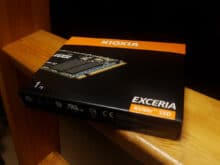
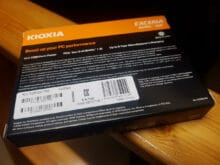
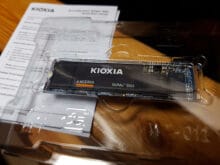
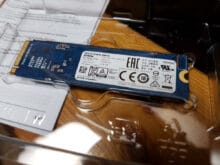
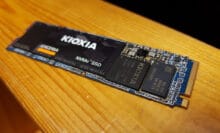
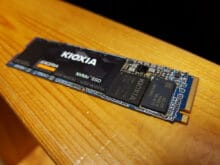
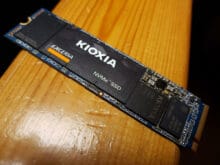
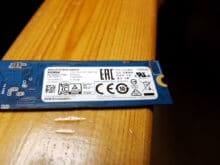
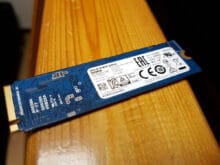

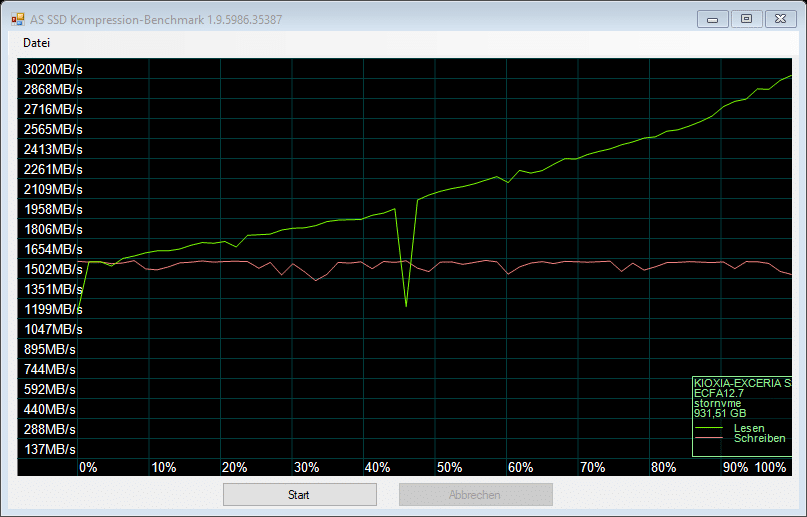
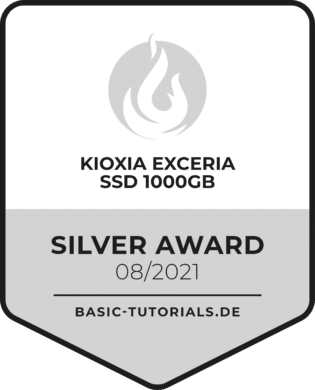
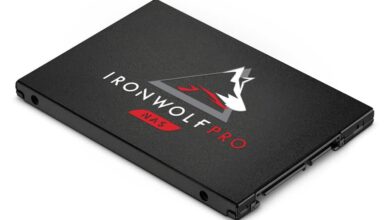
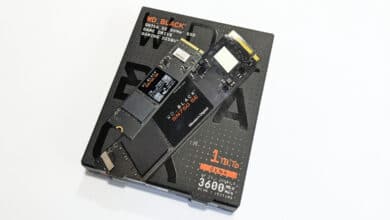
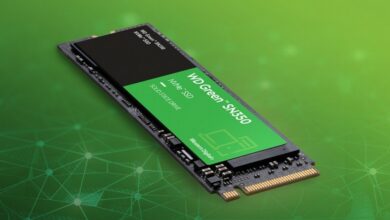
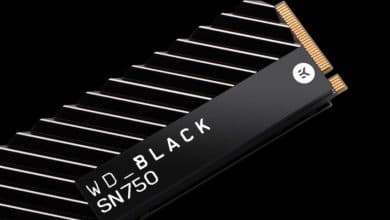
No replies yet
Neue Antworten laden...
Neues Mitglied
Beteilige dich an der Diskussion in der Basic Tutorials Community →